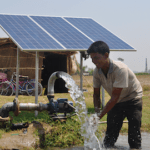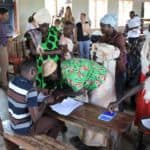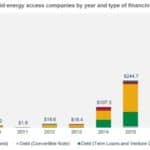Unboxing Solar: An Israeli-run Startup Works to Expand Energy Access in the Palestinian Territories
I grew up in Israel, about 20 minutes outside of Tel Aviv. I held right-wing views until I was around 15 years old. But my political viewpoint changed dramatically when a friend took me to see a checkpoint. My father is Yemeni and I look like I could be Palestinian, so the soldiers confronted me with their guns. I came away understanding that so close to my home, people just like me can get killed simply because of a wrong step that they make. It was a real turning point for me. Since then, in a variety of different ways, I have tried to use my knowledge and skills to create social change in Israel.
Humble Beginnings
Until the age of 26 I was part of a socialist Zionist youth movement, centered on educational projects working with kids during after-school hours. I also started a youth center in northern Israel working with Palestinian kids aged two to 20. I was doing mostly educational work, but my interest in programming and technology was always there; I would use programming to create educational tools, combining those two fields. I’m a self-taught software engineer, and when I left the youth movement I had my own software company and started to move into work that wasn’t necessarily educational. I started working with NGOs and in politics, including Israel’s biggest political campaign ever. I was also working with startups, but I wasn’t fulfilled. So two years ago I decided to make a big change in my life – I left the startup I was working in, and left Tel Aviv. I bought an old Mercedes bus, converted it into a house and moved out to live in nature.
While customizing the bus to be a full-featured house, I built a solar energy system on top of it. It’s so easy to do and it makes so much sense. I wanted to make the system even more accessible, so I started studying it. In the summer of 2017, I studied at Brandeis University as part of the “Our Generation Speaks” program. I learned about different energy crises in and around Israel, and I knew I wanted to do something that would help the people of these areas to have an adequate standard of living. Many of the energy crises in the Middle East are due to complicated and unjust political situations, and anything that involves trying to fix the grid is cumbersome and can take a decade. A small standalone solar solution can be installed on a house within less than an hour, and from that moment on the family becomes its own independent energy supplier.
From Market Research to launching a Social Enterprise
The SolarBox company started officially at the end of 2017. Since that time, we have been providing low-cost solar energy kits to different populations in our area – Palestinians, Bedouins and many more who are in need. Our process begins by figuring out the exact needs of the people who will be our prospective customers. We look at their specific appliance needs and provide them with higher-quality, lower-maintenance devices. In one location, we are introducing a way to remotely monitor the devices, and we are planning to train one person from each village to be a technician in case there is a problem. Since they often live in the middle of the desert, technological help is hard to access.
We also conducted market research to determine how much people could pay for this system. Making the devices self-installable was key. Solar technology itself has gotten so much cheaper, but labor to install it is expensive and makes up 60 percent of the total cost. Price is the biggest barrier for the communities that we are trying to serve. Our goal is definitely for the company to be profitable. However, rather than making as big a profit margin as possible, we are looking for our company to be sustainable, so we can continue bringing energy solutions to more people. Supporting communities who have been suffering is our primary focus.
We design kits and sell a variety of systems in different areas, according to the customers’ needs and ability to pay. All components are sourced from different factories in China. In the Palestinian Territories, a kit that costs $250 can provide people with enough power for basic lighting, charging a phone and laptop, while powering a wireless router and other small appliances for 24 hours a day. These systems can also power a fan or a small TV for a few hours a day. In the Bedouin communities, a system costs around $2,500, which can power a full-size refrigerator, washing machine, small air conditioner and pretty much everything else. We customize the kit components to fit the needs of the market, which enables us to offer low prices.
Challenge, Collaboration and Change
There definitely have been challenges in developing SolarBox. First and foremost, most areas we’re working in require special permits. It took a lot of time to work with many different ministries to get approval, and it was often frustrating. But now it’s one of our main advantages – we are often the only company that knows how to get the devices to the families, overcoming the bureaucracy. When we started, solar energy was almost completely new to me. It isn’t the kind of technology that I have worked with before, so I’m facing new challenges every day. In this regard, being part of the Seeds of Peace GATHER Fellowship has been quite impactful.
Seeds of Peace is an organization dedicated to creating the next generation of leaders who will have the skills and relationships necessary to accelerate the social, economic and political changes essential for peace. The GATHER Fellowship is a small cohort of changemakers from around the world who engage for nearly a year in intense project-building to take their ideas and impact to scale. I still have a lot to learn about how to manage, how to work with a team, how to hire, how to run a business – and the GATHER Fellowship has given SolarBox support from a community of advisors, potential investors and peers.
After installing the first solar units we are already seeing such an amazing impact on people’s lives. We installed one system in a family’s home in an area that totally lacks electricity. There was a big soccer game and their house was the only one that could show it on TV. People started gathering in their home to watch the game; it brought the whole community together. With SolarBox, people can keep food in the refrigerator, they can use a fan when it is very hot, they can study at night, they can work on their computers. It changes everything.
Before SolarBox I ran a software and web development company. Dealing with code, I always felt like half of the world could not understand the work I was doing. I wanted to do something that people could understand, and more importantly something that could directly touch people’s lives in a tangible way. Now I see families sitting around a dinner table with light. What’s more tangible than that?
Yo’av Moshe is the CEO of SolarBox.
Image provided by SolarBox.
- Categories
- Energy, Social Enterprise



